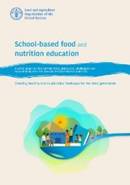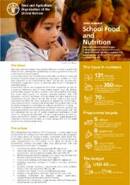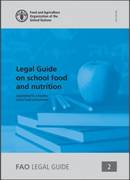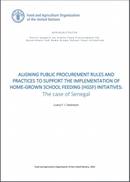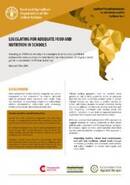Publications
School-based food and nutrition education (SFNE) helps schoolchildren and the school community to achieve lasting improvements in their food practices and outlooks; build the capacity to change and to adapt to external change; and pass on their learning to others. SFNE has also an important role in complementing efforts that are being made globally to improve food environments, and in empowering children and adolescents to become active participants in shaping the food system to be better able to deliver healthy and sustainable diets.
Despite increasing interest for SFNE, the evidence that supports it and its potential, much of traditional SFNE, particularly in LMICs, is largely underfunded, not delivering results, and disconnected from other key interventions that aim to support the food, nutrition, environment, and education nexus. SFNE is under-resourced, with capacity development opportunities lacking throughout the school system.
This White Paper is the first document of its kind, and it is based on the evidence, professional expertise, and field experience, lessons learned, and documented challenges of SFNE work in a variety of contexts. It presents the case for raising the profile and transforming the vision and learning model of SFNE. This document is directed firstly to a technical audience working in governmental organizations that deal with schoolchildren and adolescents and is also of interest to researchers, technical advisors, decision-makers, donors and investors, civil society, and UN organizations.
This note summarized FAO's approach to School Food and Nutrition highlighting the issues addressed, the main strategies and the expected results of implementing such approaches. It also focuses on why donors should invest in FAO's School Food and Nutrition model.
This Legal Guide promotes a holistic and human rights-based approach to school food and nutrition, in which legislation is an indispensable tool to ensure the sustainability of public policy goals set by a country. In light of international law and standards, it provides practical information and guidance to develop or strengthen national legislation to improve food security and nutrition in schools as well as community development. The Guide presents a range of regulatory options and legislative examples of state practice that may contribute to building sound and coherent legal frameworks for school food and nutrition. It is a useful resource for law practitioners, policymakers, parliamentarians, and all actors who are involved in the design, implementation, or monitoring of school programmes and policies and most particularly, for those interested in taking legislative action (law-making or law reform).
This report aims to inform about the alignment of public procurement rules and practices to support the implementation of government-led home-grown school feeding (HGSF) initiatives in Senegal. The publication builds on the experiences of various countries and is based on a recognition that building a linkage between school feeding programmes and local and smallholder agricultural production requires adjustments and reforms at the institutional, policy and regulatory levels. These include the alignment of public procurement laws, regulations and related practices.
School feeding laws are important instruments for the realization of the right to adequate food, the right to education, and the right to health of the schoolchildren. In addition, they fulfill a social function guaranteeing access to food of the most vulnerable children in school and the school attendance. This document will cover:
- The Regional and International Framework that serves as the basis for the development of these laws in Latin America and the Caribbean
- The main benefits of adopting an approach to school feeding and nutrition.
- The keys to adequate drafting of a School Feeding Law.
- An overview of the existing laws in the region.
- The general provisions to contain the School Feeding laws.
- And the necessary parliamentary actions to make this right effective.

